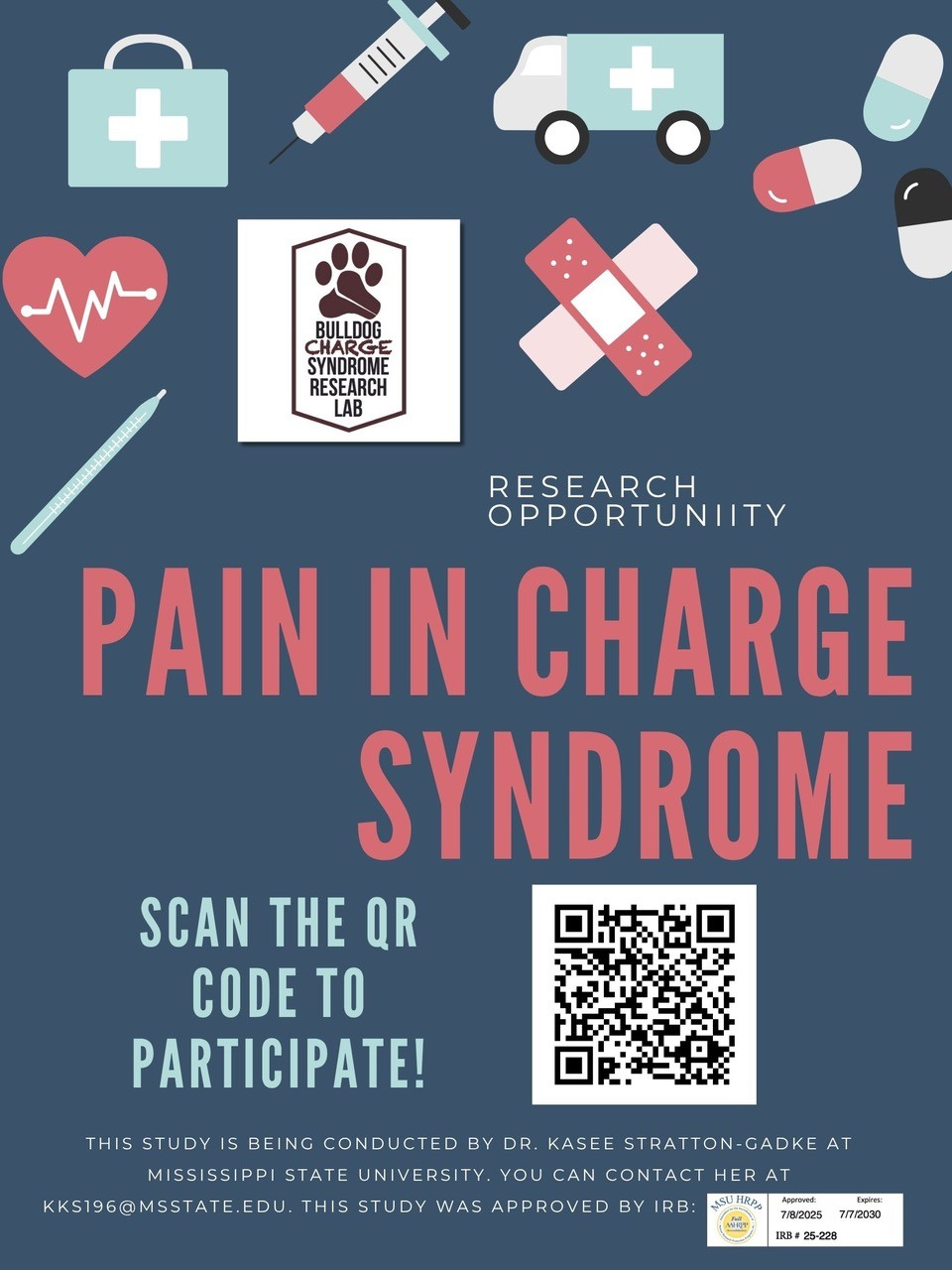HOW TO PARTICIPATE IN CHARGE SYNDROME RESEARCH
CHARGE research could not take place without the participation of the families. There are many ways you can help. At any given time, there are many studies underway all over the world to help further understand many aspects of CHARGE and CHD7. Studies range from DNA analysis to clinical features and behavior to therapies and education. As these studies benefit our children, we encourage families to participate. A great way to start is to enter your child’s baseline information into the CHARGE database CSCDP.
All projects have been approved by Institutional Review Boards (IRB). If you have a project you would like posted, contact [email protected].
EXPLORING PAIN IN CHARGE
RESEARCH OPPORTUNITY! We need your help – all ages!

The Mississippi State Bulldog CHARGE Syndrome Research Lab is currently conducting a research study exploring pain in CHARGE Syndrome. Specifically, this study aims to examine pain experiences in individuals with CHARGE throughout the lifespan. While previous research on pain has been examined in various populations of individuals with disabilities, there is little research involving those with CHARGE and no research including adults with CHARGE.
WHAT DO WE NEED FROM YOU?
We request that interested individuals click on the link below to complete an online survey, including an observation of your child (20-30 minutes). After completion of this survey, you will be sent a second survey approximately 24 hours later to complete a second observation (10-15 minutes).
WHO CAN PARTICIPATE?
- Parents/Caregivers of a person with CHARGE of all ages
- Adults with CHARGE (18+) can complete this survey. Both parties do not have to participate.
You may also be eligible to win one of ten $20 gift cards to Amazon, Walmart, or Target for completion of BOTH portions of this survey!
All data collected will be stored anonymously; neither your participation nor responses will be known by others. Please contact Dr. Kasee Stratton-Gadke, Professor and Licensed Psychologist, or Jamie Moss, Graduate Student, if you are interested in participating or w
If you would like to inquire about any further information: [email protected] or [email protected]
Thank you for your participation!
DOES YOUR CHILD HAVE A GENETIC CONDITION?
 We are conducting an online survey to understand how families adapt to a child’s genetic condition and whether children’s books can play a role in this.
We are conducting an online survey to understand how families adapt to a child’s genetic condition and whether children’s books can play a role in this.
Eligibility:
Primary Caregiver for a child with a genetic condition and:
- Your child is aged 2-17yrs old and has received a positive genetic test result.
- Live in United States
- Are proficient in English
ESTIMATED TIME: 10 – 15 MINUTES
This survey should be taken once per household.
For further information contact: [email protected]
 Parent perceptions of genetic diagnosis in the inpatient setting in the neonatal intensive care unit (NICU), pediatric intensive care unit (PICU), and cardiac care unit (CCU)
Parent perceptions of genetic diagnosis in the inpatient setting in the neonatal intensive care unit (NICU), pediatric intensive care unit (PICU), and cardiac care unit (CCU)
Would you like to share your thoughts about your experience receiving your child’s genetic diagnosis?
We are recruiting parents and caregivers who had a child that received a genetic diagnosis while in the NICU, PICU, or CCU to share their experiences in a 10–15-minute online survey. Responses from this survey may be used to guide medical providers in giving genetic diagnoses and support to families in the inpatient setting.
To participate, you must be 19 years or older and have a child who received a genetic diagnosis while in the NICU, PICU, or CCU. We are excluding parents who have children diagnosed with Trisomy 13, Trisomy 18, Trisomy 21, or Turner Syndrome as other studies have been done or should be done for these populations.
Thank you for considering sharing your experiences!
IRB: 0385-25-EX
Mental Health and Quality of Life in CHARGE Syndrome
The Mississippi State Bulldog CHARGE Syndrome Research Lab
RESEARCH OPPORTUNITY! We need your help – individuals 13 and older!
WHO CAN PARTICIPATE?
Parents/Caregivers of a person with CHARGE and adolescents and adults with CHARGE (13+) can complete this survey. Both parties do not have to participate.
The Mississippi State Bulldog CHARGE Syndrome Research Lab is currently conducting a research study exploring mental health and quality of life in CHARGE Syndrome. Specifically, this study aims to examine the mental health and quality of life in individuals with CHARGE syndrome. While mental health has been explored in various disability populations, there is limited research specific to individuals with CHARGE, and even less research that includes adults. This study aims to better understand the psychological well-being, emotional experiences, and quality of life outcomes of individuals with CHARGE across the lifespan.
WHAT DO WE NEED FROM YOU?
We request that interested individuals click on the link below to complete an online survey (20-30 minutes).
All data collected will be stored anonymously; neither your participation nor responses will be known by others. Please contact Dr. Kasee Stratton-Gadke, Professor and Licensed Psychologist, or Cecelia Powell, Graduate Student, if you are interested in participating or would like to inquire about any further information: [email protected] or [email protected]
Caregiving for children with CHARGE syndrome and related disabilities
Overview: Family caregivers play a critical role in the care of children and youths with disabilities, especially CHARGE syndrome. However, there is minimal research on the parental experience of children with CHARGE syndrome. The purpose of this study is to understand the caregiver experience and needs of parents of children with CHARGE syndrome and related disabilities. Results from this study will help fill a research gap and lay the foundation for future studies examining issues affecting caregiving in relation to CHARGE syndrome and related disabilities.
Interested in participating? Please contact Dr. Hazzan at ahazzan [at] brockport.edu
Future research contact for studies related to CHARGE syndrome
Overview: The purpose of this study is to create a contact list of people with CHARGE syndrome who can be recruited for future research studies. This will be a secure, web-based survey which will collect general contact information (i.e., mailing address, phone number, email address) for people living with CHARGE syndrome – or their family members. The goal is that this will lead to a list of people who are interested in being in a future CHARGE syndrome registry. We will also ask participants if they consent to their information being shared with other researchers – affiliated with a university or medical center – who have ethics board approval.
Survey link: https://redcapproduction.umms.med.umich.edu/surveys/?s=LC4W9LFX9FC9AXKY
Risky play and physical activity in children with CHARGE syndrome
Overview: There are many barriers that children with CHARGE syndrome face that can impact their engagement in physical activity. For example, many spaces are not accessible for children with disabilities, such as playgrounds or public parks. Parents are also a barrier between their child and physical activity. Parents are protective of their children and are concerned about them getting hurt. Physical activity and risky play are essential for helping children develop into autonomous adults capable of assessing the consequences of risk (Beetham et al., 2019). Risky play has numerous physical, cognitive, and affective benefits. Overall, it is better for a child to have opportunities to engage in risky play then for it to be avoided. Recently, there have been several studies examining risky play behavior in children without disabilities and its relationship with physical activity; however, there is a lack of research on risky play behavior in children with CHARGE syndrome. The purpose of this study is to look at the risky play behavior in children with CHARGE syndrome. Specifically, we will compare attitudes toward risky play in parents of children with and without CHARGE syndrome. Additionally, we will examine the relationship between parental attitudes toward risky play and physical activity participation in children with visual impairments.
Survey link:
https://brockport.co1.qualtrics.com/jfe/form/SV_4OyFgOEpANzWCto
Posttraumatic growth in parents of children with CHARGE Syndrome
Shelby Muhn, doctoral student working with Dr. Timothy Hartshorne in the CHARGE Syndrome Research Lab at Central Michigan University is investigating the prevalence of posttraumatic growth in parents of children with CHARGE Syndrome. Through an online survey, we are seeking to better understand how factors such as coping styles, stress, and community support impact growth in parents.
What is this for? The purpose of this study is to explore the prevalence of posttraumatic growth in parents of children with CHARGE syndrome. Additionally, this study will assess the factors that are hypothesized to impact to growth, such as stress, coping styles, external support, and severity of their child’s disability. The overall goal is to better support families and parents in raising a child with CHARGE Syndrome.
Who can participate?
Parents and Guardians must be:
- 18-years-old or older.
- Parent or legal guardian of an individual with CHARGE syndrome under the age of 18-years.
- Fluent in English.
What would participants need to do? Complete the online survey found in the link below. The online survey should take approximately 15-20 minutes to complete.
Link to online survey: https://cmich.co1.qualtrics.com/jfe/form/SV_5aur9YMdAG49OSi
If you want more information: If you have questions, you can contact Shelby Muhn at [email protected] or Dr. Timothy Hartshorne at [email protected]. Thank you for your interest in this study!
DNA causes of CHARGE beyond CHD7
University of Michigan
Description: Not all cases of CHARGE syndrome are caused by mutations in the CHD7 gene. Your family is eligible if CHD7 testing was negative or has not been done. DNA will be analyzed to look for other possible CHARGE genes. Participation involves collecting and sending saliva samples (which will be used to extract DNA for analysis) on individuals with CHARGE, parents, and siblings. Phone consent, collection kits mailed to you.
Enrollment dates: now enrolling, no end date set.
Contact: Donna Martin [email protected]; Stephanie Bielas [email protected]
For More Information: Martin DNA Study

